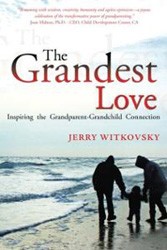This week, Claude Knobler— the author of More Love, Less Panic: 7 Lessons I Learned About Life, Love, and Parenting After We Adopted Our Son from Ethiopia blogs for The Postscript on his mother’s reaction to his parenting memoir.
The Postscript series is a special peek “behind the scenes” of a book. It’s a juicy little extra something to add to a book club’s discussion and a reader’s understanding of how the book came together.
It was the first time I can ever recall my mother acting like a U.S. senator.
 The chapter is, I think, very complimentary about my parents, but my mom wasn’t going to take my word for it, and so, she made sure to read that chapter, before ever looking at anything else in the book. Only when she was sure she’d been treated fairly, did she move on, back to the front of the book.
The chapter is, I think, very complimentary about my parents, but my mom wasn’t going to take my word for it, and so, she made sure to read that chapter, before ever looking at anything else in the book. Only when she was sure she’d been treated fairly, did she move on, back to the front of the book.
It was the first time I can ever recall my mother acting like a U.S. senator.

The advance copy of my book, More Love, Less Panic about all that I learned about parenting after my wife, two kids and I adopted a five year old boy from Ethiopia, was finally ready. Knowing I was in New York visiting my parents, my editor had my copy sent to their apartment.
Where my mother was lying in wait.
Think about how you browse through a book when you first see it. You might start at the first page. Or you might glance at the table of contents. Some people probably flip to the middle to see how they like the writing.
And then there are politicians. And mothers.
Bookstore employees in Washington DC have long been used to seeing senators march straight to a new book and go directly to the index page. Then, without hesitation, they scan to see how many times their own name appears. After that, they go to those pages, make sure that they approve of what has been written about themselves, close the book and wander happily (or not so happily) away.
It’s not really how I thought my mother would approach my book.
But, when I came into her apartment, there she was, reading the last chapter, and only the last chapter of my book. The one, as it happens, that was about her. The chapter is titled, “Grandparent Your Kids.” One of the many remarkable experiences I had after we adopted was seeing the instant connection between my new son and my parents.
Perhaps that connection shouldn’t have surprised me. My mother had been placed into a Catholic orphanage by my grandparents in Belgium during WWII. Because of their sacrifice, she survived the war, they did not. Eventually she was adopted and brought to America.
That she and my son Nati would connect makes perfect sense, but how to explain the fact that Nati and my father also quickly became the best of friends? In the book, I write about how I learned that loving without demanding that your child change into someone they’re not — the sort of love that grandparents often excel at — is the kind of love I hope to show my own children. (And I also write about how even before he learned English, my mother was telling Nati that one day he would grow up and marry a nice Jewish girl. Some things never change!).
 The chapter is, I think, very complimentary about my parents, but my mom wasn’t going to take my word for it, and so, she made sure to read that chapter, before ever looking at anything else in the book. Only when she was sure she’d been treated fairly, did she move on, back to the front of the book.
The chapter is, I think, very complimentary about my parents, but my mom wasn’t going to take my word for it, and so, she made sure to read that chapter, before ever looking at anything else in the book. Only when she was sure she’d been treated fairly, did she move on, back to the front of the book. And so, much to my own surprise, I find myself thinking of this topic….where did my parents go right? Growing up I had a great many complaints, and to be fair, I parent very differently from how I was raised but…..seeing my parents now, seeing how they listen to anything my kids tell them, seeing the joy in their faces when they get to share a meal with any of their grandchildren, leaves me wondering how can I grandparent my own children. Yes, I have responsibilities as a father that my parents no longer have to worry about (they eat a lot of cake at my mother’s house. A lot.) but they also have a joy in being grandparents that I simply am unwilling to postpone feeling.
Of course, I didn’t quite get a 100% approval. Recently my sister told me that my mother had complained that there were moments in the book where I’d made her look a bit too much like, well, a Jewish mother. Everyone’s a critic. Or a senator.ᐧ



